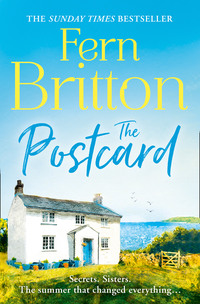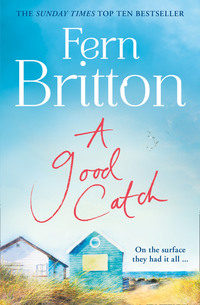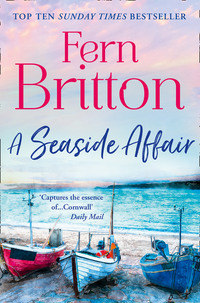
Полная версия
Daughters of Cornwall
‘The thing is,’ Ernest continued, ‘I am twenty-two and it’s my turn to get out of Cornwall and see the world.’
‘I understand that,’ I said.
‘Good. Because it’s your turn to be the good son. I’m off to fight in France.’
I thought of the war papers in my pocket. ‘Really? Ah well, that’s a bit awkward, because I enlisted this morning.’
His face turned from unwelcome surprise to anger. ‘No. I’m the one going to France. I signed up last week. I have my papers at home.’
‘I have my papers right here.’ I tapped my top pocket.
‘But I enlisted a week before you.’
‘Makes no odds. Neither of us can back out now.’
‘You selfish bastard.’ He looked at the stained yellow ceiling and sighed. ‘What are we going to do?’
‘We are going to have to tell them.’ We laughed, I realise now quite cruelly, and said, ‘They’ll still have Amy.’
At the top of our lane, Ernest turned the engine off and quietly rolled the absurd little car to the vicarage. It was now very late, and all around us the houses lay in respectable darkness, their owners sleeping soundly.
I had my old house key on my watch chain and opened the door to the hall as Ernest brought my luggage in.
‘Sssh.’ He put his index finger to his lips and promptly kicked the front door closed behind him, making an almighty bang. We stood like naughty boys, shaking with silent, terrified laughter, waiting for our father to come to the top of the stairs and tick us off. But no sound came from upstairs.
‘Fancy another beer?’ Ernest whispered.
‘Prefer a Scotch,’ I whispered back.
He put my case down by the old hat stand and beckoned me to follow him into Father’s study.
I shut the door behind me, very gently, whilst Ernest fumbled in the dark for a match to light the old oil lamp that had been on Father’s desk for as long as I could remember. Ernest got it going and turned the wick up. At once the cherished room, with all its memories, lay before me as if I had never left.
Nothing had changed. The worn leather chair by the fire. The rag rug Mother had made one Christmas with the scorch marks of a hundred wood spits dotting it.
The curtains were drawn shut, keeping out the night and the draught that always seeped through the old sash windows.
In this room I had received my (un)fair share of whacks on my palm from my father’s ruler. It was also where I had been told, with some relief, that I had a place at Cambridge to read Classics. And, it was where I had brought my mother to tears, announcing that I was off to Malaya to make my fortune.
I had never expected to see the familiar yards of books on the shelves again, or the inkstand with the fountain pen that Father had received from his parents when he was ordained, and the family photo. All five of us. Mother tiny, Amy very tall and angular, me in my old school uniform and Ernest stiff and unsmiling, wearing short trousers, leaning on Father who was sitting on his chair. His throne.
‘My God. Nothing has changed.’ I settled myself by the fire. Ernest, who’d been searching the bookshelves, finally found a bottle of good malt between Flora and Fauna of the British Isles and The Free Church Year Book, 1912 edition.
‘Get that down you.’ He chinked my glass. ‘Welcome home, big brother.’
‘Cheers.’ I raised my glass to him then drank.
He settled himself opposite me and we sat, easy in each other’s company, neither of us feeling the need to speak.
The Scotch was instantly relaxing and I closed my eyes. I was home.
Quite suddenly my mother burst through the door. ‘Oh my darling, Bertie!’ She was standing before me in her nightdress and shawl, shaking off the restraining hand of my father. ‘Ernest.’ She pointed at him. ‘How could you not have woken us?’
‘I didn’t know you wanted to be woken.’ Ernest shrugged.
My father said quietly, ‘The boys have a lot to talk about, I expect.’
I stood up immediately, and put the glass down. ‘Darling, Mother.’ I embraced her. ‘You look wonderful.’
She kissed my cheek and held me away from her. ‘Home for the summer! But you’re too thin. All that rice and all those spices. Cook will make you some good English food tomorrow. How about shepherd’s pie? We can still get good mutton.’
‘My favourite! And how is dear Cook?’
My mother pursed her lips. ‘Just the same. Always complaining. Amy deals with her now although how she manages her, I don’t know. Constant complaints about the stairs and her bad knees and her kitchen budget.’
My father stopped her flow. ‘My dear, Bertie doesn’t want to hear about all that just now.’ He had gained a little weight and maybe his beard was a little longer, but my father’s comforting bulk made me want to hold him, press my face against him and inhale the soothing smell of him. I resisted the impulse and held out my hand to shake his. He winked at me. ‘Good to see you, boy. Welcome home.’ He turned to Ernest with a playful smile, ‘And put that bottle away now.’
Ernie produced the whisky from where he’d stuck it behind his back and handed it to my father’s outstretched hand. He checked to see how much we had taken.
‘Hmm. Still plenty left. We can share it tomorrow, boys, after dinner.’
My mother said peevishly, ‘I can’t wait until tomorrow. I want to hear all Bertie’s news now.’
‘My dear Louisa,’ my father said. ‘The boy needs some sleep. There’s plenty of time for his news now that he’s home for good.’ He looked at me. ‘Isn’t that right, son?’
I saw Ernest’s eyes flick towards mine. I kept my gaze set on my father. ‘I’m sure we have a lot of news to share. Don’t we, Ernest?’
Chapter Six
Herbert, Callyzion, the calm before the storm
June 1915
‘Give Bertie more sausages, Amy,’ my mother ordered from her seat at the breakfast table. ‘He needs some proper food.’
Amy got up without smiling, took my plate and went to the sideboard where Cook and Dora, our maid, had laid a feast of eggs, bacon, sausage, tomatoes and mushrooms. ‘How many do you want?’ Amy asked with her back to me, her shoulders set. ‘I know that Cook was wanting the leftovers for tomorrow’s casserole.’
‘Amy!’ My mother’s response was harsh. ‘Cook will have to make something else for tomorrow.’
Amy returned my plate, now laden with sausages. As she sat down she said, ‘Oh yes, I had forgotten the fatted calf we have in the larder.’
Father gave her a stern look. ‘Gracelessness does not become you, Amy.’
I smiled at my little sister, ‘That’s OK. I’m not here to eat you out of house or home.’
She fiddled with the napkin on her lap. ‘I apologise, Bertie.’ She added, ‘It is good to have you back home.’
‘It’s good to be home.’ I meant it. ‘How have you been, Amy?’
She glanced at Mother who was buttering some toast. ‘Just the same,’ she said.
‘Any news on Peter?’ I asked as I sliced into a sausage.
She shook her head, eyes down.
‘Any idea where his battalion is?’
‘No.’
‘But he writes to you?’
She stood up, ‘Do excuse me, there’s something I have forgotten.’
When she’d gone, I looked around the table. ‘I feel I have said the wrong thing.’
My mother became very businesslike. ‘The truth is, she writes to him twice a week but hasn’t had a reply for six weeks. She scours the list of casualties in the papers every day, but there is no news.’
‘Then he must be OK.’ I tried to sound cheerful. ‘It must be awfully hard getting letters into or out of France given the circumstances.’
My father wiped his lips and beard with his napkin. ‘We can only pray.’ He stood up. ‘My dear, that was very nice. Thank Cook for me.’
‘Where are you going?’ my mother asked testily.
‘I am taking the boys into my study. We have a lot to discuss.’
‘Then I am coming too.’ My mother stood up.
My father held up a hand. ‘No, my dear.’
‘But I want to hear all you have to say. All Bertie’s news.’
‘And you shall, but first we have men’s things to discuss.’ He made for the door and signalled for Ernest and me to come with him.
The curtains had been pulled open and the June sun slanted onto the large desk where Father took his seat.
He motioned at us to take our seats. I took my cigarettes from my pocket and proffered one to Ernest. ‘Thanks, old man,’ he muttered, searching his pocket for a match.
‘Don’t let your mother catch you,’ Father growled, but his eyes gave us his tacit approval. He leant back in his chair, hands over his stomach, and looked at the ceiling. ‘I am assuming that both of you are going to France?’
Ernest flashed me a look of terror.
I put my cigarette to my lips and inhaled deeply.
Ernest had gone white.
‘Yes, Father. I joined up yesterday.’
His gaze remained on the ceiling. ‘The Army?’
‘Yes sir. London Scottish.’
‘Why?’
‘It was the nearest recruiting office to Victoria Station.’
‘And you joined up on a whim? Or for your country?’
I took a moment to think, stubbing out my cigarette and immediately lighting another. ‘I saw a German boat, masquerading as a British cruiser. It had put up a false funnel, of all things. It was only when the captain ran up the German flag that we realised what was happening. By then it was too late.’
I could still hear, smell and see the thrashing, doomed men, screaming as they burned. ‘It came into George Town harbour and I watched as it torpedoed a Russian vessel.’
‘What utter bastards,’ Ernest fumed.
‘May God have mercy on their souls,’ my father intoned.
I shifted in my chair and tried to make light of it. With a smile I said, ‘Well, you can imagine that after that I decided the Navy was not for me.’
Ernest sniggered but Father did not. I continued, ‘And I’m not one for heights so the Air Force would be no good.’ I finished, limply, ‘So, it had to be the Army.’
My father asked simply, ‘When do you go?’
‘Six days. Must turn up, you know, like the proverbial, at Abbotts Langley barracks for training.’
‘I see.’ He stroked his beard thoughtfully. ‘And you, Ernest?’
‘I have my teaching position at Oundle, as you know,’ he said shiftily.
‘I do know. But I also know that they are not expecting you until the war is over. That was what you wrote to tell them, wasn’t it?’
Ernest’s mouth fell open.
‘I am not a fool, Ernest,’ my father continued. ‘I would have done the same as a young man. Which regiment?’
‘Duke of Cornwall Light Infantry,’ Ernest said quietly.
My father continued with the rhythmic stroking of his beard. He watched us. We waited.
Eventually he sat up and placed his hands on his desk. ‘You are not to tell your mother,’ he said. ‘I want her to have the next few days without worry. When you both have to leave, and I suggest you leave at the same time, I will hand her the letters of explanation you will each have written to her. Do you understand?’
‘Yes sir,’ we replied in unison.
‘Now, not a word of this to anyone outside this room. For the next few days I expect you to be on your best behaviour and to demonstrate the affection you have for Amy and your mother. If anything should happen,’ he cleared his throat, ‘to either of you, in France, they shall have the best of recollections.’ He reached for his fountain pen and filled it slowly from his ink pot. ‘Now, my sons, I must ask you to leave to allow me to get on with my business.’
When we had closed the door of the study, and were standing in the hall, we heard our father praying for our safety. I know it nearly broke my heart.
Six days later, Ernest and I had done as our father had prescribed.
We had told our mother nothing, and had been the perfect sons. I mowed the lawn and mended the old swing under the apple tree. When all was done, I asked Dora to serve afternoon tea beneath the tree. My mother was persuaded to sit on the swing and I pushed her gently. She was so happy. Her sons at home, her daughter setting the tea table, her husband solid and kind. She sat on the swing giggling like a girl.
Then she said, ‘Oh, my dearest Bertie. It is so good to have you home. I am blessed to have such loving children.’ The guilt I felt then nearly floored me.
I felt, as I left my envelope next to Ernest’s on the hall table, a terrible coward. My father had prayed with us the night before and given us his and God’s blessing.
How on earth was he going to cope with my mother when she discovered how he, and we, had betrayed her? I could have stopped it there and then. Written to the War Office explaining that my parents needed me at home for the duration. But instead, I collected my coat and bag, and with Ernest in front of me, closed the front door and crept away.
We walked in silence to the crossroads where the bus to Bodmin stopped. While we waited there, I made some innocuous remark about the early mist rolling in. ‘It should burn off by mid-morning.’
Ernest looked skywards and sniffed like an old mariner. ‘Mmmh.’
The bus arrived and took us down winding lanes and up steep hills, collecting a straggle of early passengers. From our high seats we could get the odd glimpse of the sea through breaks in the hedge and the mist, before the vapour cloaked them again like a magic trick.
At last we dropped down into the heart of Bodmin town and, as we got off, the driver called out, ‘Good luck in France.’
‘Thank you,’ Ernest and I replied together.
I slammed the door and the driver put the clutch in, ground the bus’s gears into first and drove away.
‘Nice of him.’ I smiled at Ernest.
‘Very.’ He picked up his bag. ‘Well, this is where we say goodbye.’
‘Just au revoir,’ I said, reaching my arms out to him.
Our hug was awkward, what with our heavy bags banging against each other, but neither of us dismissed the affection and importance of it.
My words were spoken into his neck. ‘Good luck, Ernie.’
‘You too, Bertie.’
The fog from the moor was gathering around us.
‘Right.’ We let go of each other. ‘I’d better get to the station.’ I turned my head away. ‘Look after yourself.’
‘You too.’ Ernie was finding his boots suddenly fascinating. ‘Let’s hope the bally thing isn’t over before we get there. Toodle-pip.’
‘Bye.’
I watched him as he went; in just a few paces he had all but vanished in the fog. I could hear him whistling as he headed towards his barracks.
I stayed until I could hear him no longer, then set off on the three-mile walk to Bodmin Road station.
Back in London, the sun was shining. I reported for duty at Buckingham Gate and was given a warrant to attend the Abbotts Langley Camp two days hence. Two days! I could have stayed longer at home, after all. I quickly swept aside the guilt I felt for leaving my mother early and decided that if these were to be my last two days in London, I’d have a damn good time.
I had three guineas in my pocket, pressed on me by my father, with an order to go to the Army and Navy Stores on Victoria Street and kit myself out with extra socks, warm underwear, good boots, and a decent razor. The extravagance and pleasure of spending money buoyed me up no end. I even had some money left, so I went to a pub, ordered myself a pint of London Pride, and thought about how I might spend the evening.
The barmaid was very pretty and overtly flirty. She made it clear that, for payment, she would, as she put it, give me a relaxing hour when her shift finished. I let her down gently and politely and, when I paid my bill, left her a small tip for her kindness. She gave me a sweet smile and told me I would always know where I could find her.
I stepped outside into the warmth of the London evening. The city was full of promise and romance. Lighting a cigarette, I strolled south towards St James’s Park.
Buckingham Palace stood ahead of me. The Royal Standard was fluttering limply from its flagpole. I caught a glimpse of chandeliers, twinkling from the upstairs apartments. King George the Fifth was in residence. The same king I had sworn to serve only days ago.
The enormity of it all hit me like a club. I am not a religious man, much to my father’s disappointment, but at that moment I closed my eyes and prayed that I would be brave enough.
‘All right, sir?’ A policeman had approached.
‘Yes, yes,’ I stuttered, ‘Fine.’ Had he seen my appalling cowardice?
He tipped his helmet to me. ‘Have a good evening, sir.’
‘Thank you.’ I headed down The Mall. The scent of mown grass coming from Green Park on my left and St James’s Park on my right was sweet and reminded me of Cornwall.
I passed St James’s Palace and turned left, heading towards Piccadilly.
A memory struck me. Somewhere on Piccadilly there had been a bridge club I’d visit with friends when up from Cambridge. Could it still be there?
It took me about a quarter of an hour but I found it: 26B, The Piccadilly Bridge Club.
The familiar door was opened by a chap who was new; after a brief introduction, he pointed the way up the well-remembered, ornate but peeling staircase.
The quiet voices of players hummed behind the grand double doors of the club room, cheering me up. I was looking forward to a game and hopefully finding chaps who remembered me. I turned the door handle and poked my head around to make sure I was in the right place. It was the same room but it wasn’t quite the same atmosphere. This had always been a gentlemen’s club, but now I saw there were women sitting at the tables. I did what any chap would do in the circumstance, I walked in and went to the bar.
‘Scotch, please.’
‘Righto, sir.’
I leant my back to the bar and surveyed the room.
A man on the opposite wall took a cigar from his mouth and waved at me. ‘Bolitho!’ He navigated the tables briskly and arrived in front of me, wreathed in smiles. ‘Glad to see you. Glad to see you.’
‘Good God,’ I said, shaking his hand. ‘Jimmy. Long time no see.’
‘How long has it been?’ He beamed.
‘Well, I’ve been in Malaya since early 1912.’
‘How hot is it?’
I laughed. ‘Is that all you can ask me after all these years?’ It was good to see him. ‘What are you up to?’
‘Oh, the usual. After Cambridge, I did Europe, the tour you know, bloody good timing. I hear the fighting is destroying the place.’
‘Yes. Terrible. I’ve been reading about it. Can I get you a drink?’
‘Scotch please.’
I caught the eye of the barman.
‘Anyway,’ Jimmy continued, ‘I came back because Father wanted me in the family business, you know the thing.’
I did know the thing. For generations his family had made their money from the bank bearing their name.
I paid the barman and handed Jimmy his whisky. ‘And are you enjoying it? The bank?’
He grinned, ‘Oh, let’s not talk about money, I want you to meet someone.’ He took my elbow. ‘I have found the woman of my dreams. And she’s a damn fine bridge player.’
He guided me to the edge of the room where two women were sitting on their own with a pack of cards lying in the middle of the small square table.
‘Marianne, may I present one of my best friends from Cambridge, Mr Herbert Bolitho.’
Marianne looked perfect for Jimmy. Clearly of good stock. Wearing a short pearl necklace and a good diamond on the fourth finger of her left hand. ‘Hello,’ I said. ‘I’m very pleased to meet you. Jimmy is a lucky man.’
Jimmy and Marianne looked at each other and giggled. ‘He certainly is,’ she said.
‘And this young lady is …’ Jimmy faltered, clearly not remembering the name of the other young woman.
She spoke for him. ‘Clara Carter.’ Her voice was low and even. Her hand felt cool as I shook it.
My first impression was of a young woman in her early twenties, dressed soberly and unadorned. No jewellery or rouge. Her dark hair in a neat bun at her neck. The edges of her eyes turned slightly down, almost sad, but they also shone with an interest and intelligence rarely seen in the eyes of the wealthy, bored women I had met in Malaya. She smiled. Her teeth were even. ‘Would you care to join us?’ she asked. ‘We can be partners.’
‘I’d love to,’ I said, pulling out the chair opposite her.
Jimmy sat down and nudged Marianne. ‘He’s a damned good player. We’d better keep a keen eye.’
‘Jimmy! Language.’
‘Sorry m’dear.’
Jimmy ordered some more drinks, and we began to play. And, as we played, the more I admired Clara. Not in a physical way but in the way she comported herself. The more we played, the more in tune we became. I liked the way she played, and the way I understood her eyes as they signalled to me what card she might play next and enquiring if I had something to our advantage. If I had concentrated more on the game and less on her, we might have won, but Jimmy and Marianne were ferociously competitive and bickered constantly.
It was almost a relief to let them win.
The barman signalled last orders and the room began to thin out.
‘Goodness.’ Marianne checked her watch. ‘Daddy will be so cross with me. I told him I’d be in by eleven and it’s now almost eleven thirty.’ She turned to Clara. ‘He waits up for me. I expect your parents are the same?’
‘Unfortunately, my parents are no longer alive,’ Clara said, without looking for sympathy. ‘I am my own keeper.’
‘God, I’m envious,’ snorted Marianne. ‘Can’t wait to get married. Jimmy and I will be free to do as we please.’
‘Steady on old girl.’ Jimmy put her coat, mink by the look, around her shoulders. ‘I shall have to take a cold bath when I get home.’
Out on the pavement, the air had cooled considerably. Jimmy and Marianne said their goodbyes and left Clara and me standing awkwardly together.
‘You play bridge very well,’ I said.
She smiled. ‘I am a beginner.’
‘Really? Well you seem to have picked it up very well.’
‘Thank you.’
‘May I walk you home?’ I asked.
‘It’s too far,’ she said, doing up her thin coat.
‘Where?’
She hesitated. ‘The other end of the Strand.’
‘Well I can’t let you go all that way on your own.’
‘I’ll be fine.’
‘It’s not out of my way, I have nowhere to stay tonight yet.’ I said it without thinking.
‘I see.’ She gave me a look of pure disappointment. ‘What do you take me for?’ She turned on her heels and walked quickly away, tossing over her shoulder, ‘Goodnight, Mr Bolitho.’
‘Miss Carter,’ I called, picking up my bag and running after her. ‘Miss Carter. You misunderstand me.’
‘Oh, I don’t think I do. I’ll call a policeman if you don’t leave me alone.’
‘I am the son of a vicar,’ I said plaintively. ‘I am about to go to France.’
‘Oh yes?’ Her look was withering. ‘That’s what they all say. I wasn’t born yesterday.’
‘Honestly. It’s true. I arrived in London today and I have forty-eight hours before I go to my training camp in Abbotts Langley.’
She was striding away from me now. ‘Leave me alone.’
‘That came out all wrong.’ I went after her in order to explain. ‘I came up from Cornwall tonight not expecting to be given two days before I have to leave London. I need to book a bed for the night yet, which is why I have no hotel to go to …’
‘Well, you’re not having mine.’
I stopped walking and called after her, ‘I am so sorry. Please, I meant nothing. I won’t bother you any more. It’s been a delightful evening.’
She stopped. ‘Are you telling the truth?’
‘Yes.’
‘You really are a vicar’s son, who hasn’t got a bed, and is going to France?’
‘Yes. Honestly.’
‘Well.’ She paused, giving me the once-over. ‘You can walk me to my door and that’s it. As it happens there are a couple of hotels near me.’ She smiled. ‘I can’t have a brave soldier sleeping on a park bench, can I?’







